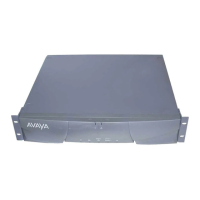SYNC (Port-Network Synchronization)
Issue 1 May 2002
8-1509555-233-143
SYNC (Port-Network Synchronization)
This section discusses synchronization problems local to the switch. For further
information about synchronization including network synchronization, refer to
AT&T Network and Data Connectivity.
Synchronization maintenance is composed of both hardware and software
components, and its purpose is to provide a common reference frequency for
reliable digital communications between an S8700 Media Server system and
other PBXs, central offices (COs), or customer-premises equipment (CPE).
Synchronization is implemented using several system components including:
■ TN2312 IPSI
■ TN722, TN767, and TN464 DS1 Interfaces (all suffixes)
■ TN768, TN780, or TN2182 Tone-Clock
■ TN572 Switch Node Clock
■ TN573 Switch Node Interface
■ TN570 Expansion Interface
NOTE:
If both a primary and secondary references are administered for Stratum-4
synchronization, both references must reside in the same port network (PN).
Traditional Sync Operation
For a previous DEFINITY system, or optionally for an S8700 Media Server
Mulit-Connect system, synchronization is obtained from the public circuit-switched
network via either:
■ A DS1 or BRI interface
■ The ATM network
For DS1- or BRI-based synchronization, a particular DS1 or PRI interface is
configured as the synchronization reference. The IPSI/Tone-Clock board in the
same PN locks on to this reference and regenerates clock signals that are placed
on the EPN’s backplane. In turn, the Center Stage Switch (CSS) components
transfer this timing to every other PN. These IPSI/Tone-Clocks then regenerate
clock signals for their own PNs at the same rate as the:
■ Master PN
■ Public network
MO’s Name (in
Alarm Log) Alarm Level
Initial SAT Command to
Run Full Name of MO
SYNC MINOR display errors Port Network Synchronization
SYNC WARNING test synchronization Port Network Synchronization

